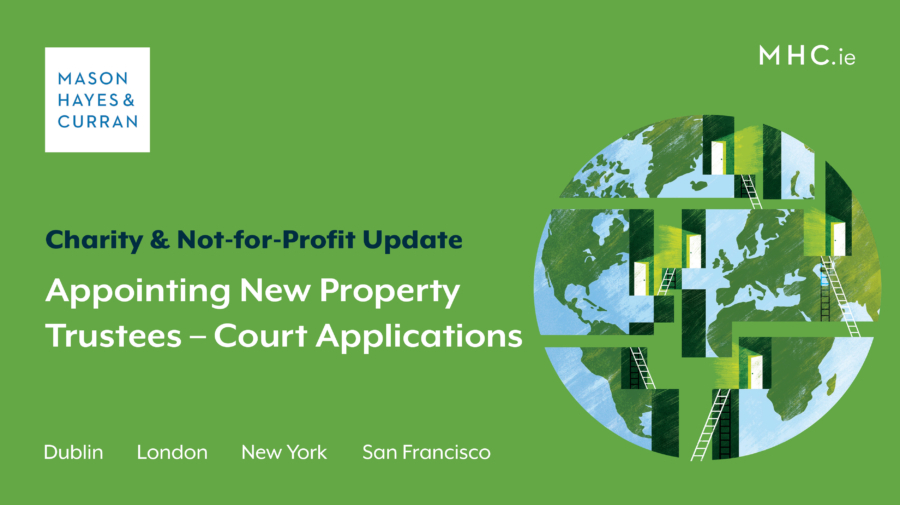Appointing New Property Trustees – Court Applications

Trusts are structures that can continue to exist long after the original trustees have ceased their roles. For charitable trusts, issues can arise if all the property trustees are deceased. If there are no provisions in the governing trust deed to appoint new trustees, the charity can make an application to the Charities Regulator to appoint new property trustees.
The volume of applications to the Charities Regulator to appoint new trustees is resulting in delays. Applications can in some cases take in excess of 12 months to complete. Commonly, the survival of property trustees only comes to light when a disposal of the relevant property is in motion. For this reason, delays with applications to the Charities Regulator can materially impact the charity and its ability to dispose of, or enter into, any agreements regarding the property.
An alternative to the Charities Regulator route is an application to the High Court under section 25 of the Trustee Act 1893. This section provides that the Court may, whenever it is expedient, appoint new trustees. If it is found inexpedient, difficult, or impractical to do so without the assistance of the Court, the Court can make an order to appoint new trustees, to replace existing ones or to act alongside them.
An application under section 25 of the Trustee Act 1893 is made to the High Court by way of Special Summons grounded on an affidavit. The grounding affidavit should be detailed and set out:
- The reasons why a court appointment is needed
- Evidence of the deaths of previous trustees, including death certificates
- Information about the occupation of the proposed new trustees to show they are suitable for the position
- Written agreement from the proposed trustees confirming they accept the appointment. A valuation of the property may also be required
Once the Special Summons and grounding affidavit are filed in the Central Office of the High Court, the matter is entered in the Master’s List for subsequent transfer to the High Court.
Prior to the commencement of the High Court application, the charity must notify the Charities Regulator of the proposed legal proceedings.
If the application to the High Court is successful, an Order will be granted appointing the proposed new property trustees. If the title to property involved in the application is registered in Land Registry the Order should include specific instructions. These instructions must direct Tailte Éireann to accept any necessary filings or registrations on foot of the Order. If this is not obtained, it may be difficult to have the folio (property records) updated with the names of the new property trustees.
The time frame for section 25 applications can vary depending on the complexity of the application and Court lists. Nevertheless, these applications are often significantly faster than an application to the Charities Regulator. This helps charities to be more agile when making decisions about disposal of their property.
Top tips
Top tips for applicants when making a section 25 application to appoint new property trustees:
- Set out the reasons why the application is necessary.
- Confirm that there is no power to appoint new trustees in the trust instrument.
- Show that it is in the best interests of the beneficiaries.
- Provide a letter from the proposed trustees showing their willingness to become trustee and to discharge the fiduciary duties of the office.
- Notice of the application should be given to the Charities Regulator.
- Where the title is registered in the Land Registry, request that the Court Order contain a specific direction to Tailte Éireann to accept any filings or registrations on foot of the Order.
For more information and expert advice, please contact a member of our Charity Law and Not-for-Profit team.
The content of this article is provided for information purposes only and does not constitute legal or other advice.
Share this:



